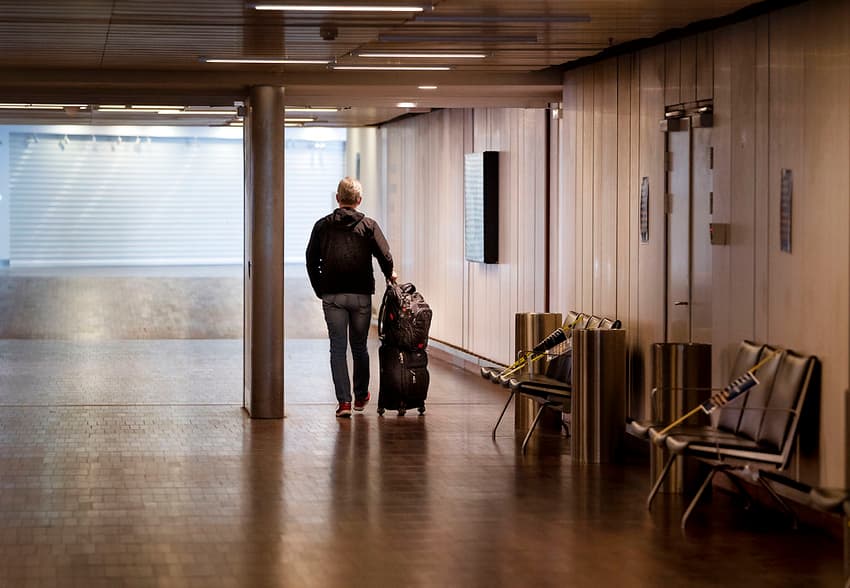Denmark set to enforce entry quarantine as parliament backs move

A majority in parliament now supports mandatory isolation for people travelling into Denmark from abroad.
Enforcement of entry quarantine in Denmark could mean fines or even prison for people who do not comply with the rules, according to justice minister Nick Hækkerup.
Danish authorities have not previously enforced arrival quarantine and currently recommend a 10-day isolation period upon arrival or return from abroad.
But that looks set to change with a majority in parliament now in favour of requiring quarantine, a practice that has been in place for months in neighbouring Norway.
The new rule is likely to take force next week following an expedited process through parliament to amend the current emergency epidemic law, broadcaster DR writes.
The 10-day quarantine period can be shortened under the proposed rule if a PCR test for Covid-19 taken after four days returns negative, according to DR’s report.
All passengers arriving at Danish airports will be required to take a Covid-19 test.
“A very broad majority of parliament’s parties have joined a political understanding to avoid us getting more of the mutations that have the country currently locked down,” Hækkerup told DR.
READ ALSO: Could all passenger traffic to Europe from non-EU countries be halted over Covid variants?
Hækkerup also said that both Danish and foreign citizens would be subject to the quarantine rules.
Fines and prison sentences would both be potential punishments for breaking the law.
Some exemptions, including for people transporting goods into the country, would be included in the rules, the minister confirmed.
Currently, Denmark requires everyone travelling to the country by air to provide a negative Covid-19 test no more than 24 hours old when boarding flights. Foreign nationals who live in Denmark are subject to the rule, as are Danish citizens.
The rules came into effect on January 9th and are scheduled to expire on February 7th.
Non-Danish nationals who live in regions of Sweden and Germany which border Denmark can travel to Denmark with a negative Covid-19 test up to one week old, provided they have a ‘valid' reason for travel, when entering at land or bridge borders. Non-resident foreigners must provide a negative Covid-19 test no more than 24 hours old.
Non-Danes who live in the UK and South Africa are essentially banned from entering Denmark at the current time, while incoming flights from the United Arab Emirates are not permitted to land in Denmark.
The country’s foreign ministry is currently advising against foreign travel to the entire world.
Comments
See Also
Enforcement of entry quarantine in Denmark could mean fines or even prison for people who do not comply with the rules, according to justice minister Nick Hækkerup.
Danish authorities have not previously enforced arrival quarantine and currently recommend a 10-day isolation period upon arrival or return from abroad.
But that looks set to change with a majority in parliament now in favour of requiring quarantine, a practice that has been in place for months in neighbouring Norway.
The new rule is likely to take force next week following an expedited process through parliament to amend the current emergency epidemic law, broadcaster DR writes.
The 10-day quarantine period can be shortened under the proposed rule if a PCR test for Covid-19 taken after four days returns negative, according to DR’s report.
All passengers arriving at Danish airports will be required to take a Covid-19 test.
“A very broad majority of parliament’s parties have joined a political understanding to avoid us getting more of the mutations that have the country currently locked down,” Hækkerup told DR.
READ ALSO: Could all passenger traffic to Europe from non-EU countries be halted over Covid variants?
Hækkerup also said that both Danish and foreign citizens would be subject to the quarantine rules.
Fines and prison sentences would both be potential punishments for breaking the law.
Some exemptions, including for people transporting goods into the country, would be included in the rules, the minister confirmed.
Currently, Denmark requires everyone travelling to the country by air to provide a negative Covid-19 test no more than 24 hours old when boarding flights. Foreign nationals who live in Denmark are subject to the rule, as are Danish citizens.
The rules came into effect on January 9th and are scheduled to expire on February 7th.
Non-Danish nationals who live in regions of Sweden and Germany which border Denmark can travel to Denmark with a negative Covid-19 test up to one week old, provided they have a ‘valid' reason for travel, when entering at land or bridge borders. Non-resident foreigners must provide a negative Covid-19 test no more than 24 hours old.
Non-Danes who live in the UK and South Africa are essentially banned from entering Denmark at the current time, while incoming flights from the United Arab Emirates are not permitted to land in Denmark.
The country’s foreign ministry is currently advising against foreign travel to the entire world.
Join the conversation in our comments section below. Share your own views and experience and if you have a question or suggestion for our journalists then email us at [email protected].
Please keep comments civil, constructive and on topic – and make sure to read our terms of use before getting involved.
Please log in here to leave a comment.